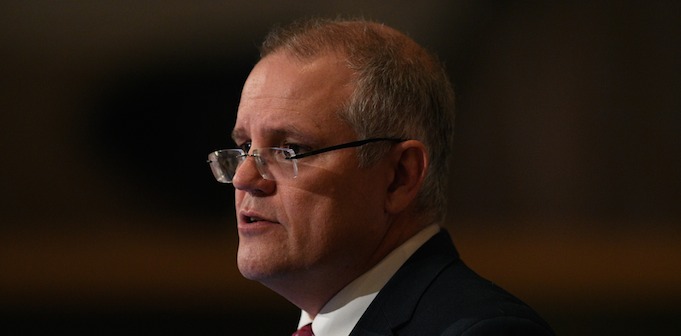
Prime Minister Scott Morrison. Source: APP/Dan Himbrechts.
The Australian tech sector needs to better communicate the benefits of startups and new technology to the wider population if it is to thrive in the future, Treasurer Scott Morrison told an audience of tech professionals yesterday.
The comments were delivered in an address to the Australian Computer Society in Sydney, and while Morrison assured audiences “it is still the most exciting time to be in Australia”, he warned that future growth and change in the “digital economy” will be hindered if the tech sector doesn’t get better at engaging the public and celebrating its wins.
“We know that this whole area, while it contains enormous opportunities, can also be incredibly intimidating to people,” Morrison said of Australia’s growing tech sector.
“It’s often very hard for them to understand the real changes and improvements in living standards that it can deliver for them and how, when it’s harnessed for their purpose and their benefit, there are big changes that can be made.”
Morrison stressed the need for startups and tech players to communicate to the public why advances in their sector help the economy and contribute to Australia’s future, something he believes is currently left wanting.
“People need to be able to understand that we need to be able to communicate clearly why this helps them. If it has no utility for them, don’t expect them to be interested. We have to be able to explain the benefits, not the features; the benefits are what will sell the change,” he said.
StartupAus chief executive Alex McCauley agrees the tech sector can be intimidating for the general public because of its potential to disrupt traditional industries and job roles, but says government also has a role to play in fostering communication and education about the sector.
“One of the big challenges is that people see technology as a force for job displacement. We can’t ignore that. We need to address those fears and implement proactive policies to lessen any negative impact,” McCauley tells StartupSmart.
While McCauley says these fears are misplaced because “startups are a huge source of jobs growth” and employ people in “future-facing jobs with fantastic career prospects”, he acknowledges startups need to use storytelling to communicate these benefits and dispel this fear.
“Startups do need to get better at telling the story of the sector’s impact on the broader economy,” McCauley says.
But he says while it is the sector’s “job to tell the story”, all levels of government also play a key role in getting this message to the masses.
“We need the help of governments around the country if we’re going to get the message out to the community more broadly,” he says.
“All of that means we need governments to be active, both in telling the stories that we know are out there, and in putting the right settings in place to ensure Australia’s economic transition is a successful one.”
Sarah Moran of Girl Geek Academy agrees with McCauley’s sentiment, adding that “startups just don’t have the budget or resources to do this to its full capacity without help from the wider ecosystem”.
“It’s everyone’s responsibility if we expect to see the industry thrive and pull down the walls that shield people from how fun, inclusive and important this industry is for Australia,” she tells StartupSmart.
Lifting the startup veil
As the founder of Australian startup survey StartupMuster, Monica Wulff gets an intimate insight into the nature of Australia’s startup scene. She believes that “startups are natural born storytellers” and “startup 101 is being able to tell your story”.
Wulff believes it is the media, rather than only the government, that are the gatekeepers of these stories, able to share awareness and drive understanding and interest in startups to the wider public.
“There needs to be the awareness, understanding and interest from mainstream media, so that startups can access those channels and their audiences,” Wulff says.
“Perhaps we need to get better at pitching stories to mainstream media, but the interest needs to be there as well.”
Wulff says the “veil between the startup community and the general population hasn’t been lifted yet” and encourages the media and the general population to engage further with the startup community to see “it’s made of much more than coding” and is making key contributions to Australia’s economy and future prosperity.
For those mystified by what lies beyond the startup veil, startup commentator Anne-Marie Elias says getting involved in the ecosystem will dispel a lot of these feelings of intimidation and disconnection.
Elias suggests Morrison should spend some time in the startup ecosystem himself, to see that startup initiatives like Refugee Talent and Hack4Homelessness can exist in the tech sector but also solve real-world problems.
“Let’s invite him to meet some of these startups who aren’t intimidating and then he can be a champion of these stories. Refugee Talent for example is placing refugees into jobs better than the government could do,” Elias says.
“I would invite him [Morrison] to come and see it through my eyes, and the eyes of many like me who fell into the sector,” she says.
“I feel at home — I’ve been welcomed and supported and had more love and joy from the tech sector than the government.”
Follow StartupSmart on Facebook, Twitter, LinkedIn and iTunes.


COMMENTS
SmartCompany is committed to hosting lively discussions. Help us keep the conversation useful, interesting and welcoming. We aim to publish comments quickly in the interest of promoting robust conversation, but we’re a small team and we deploy filters to protect against legal risk. Occasionally your comment may be held up while it is being reviewed, but we’re working as fast as we can to keep the conversation rolling.
The SmartCompany comment section is members-only content. Please subscribe to leave a comment.
The SmartCompany comment section is members-only content. Please login to leave a comment.